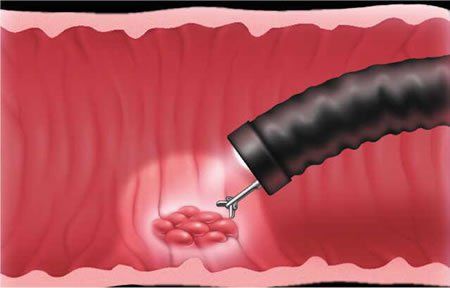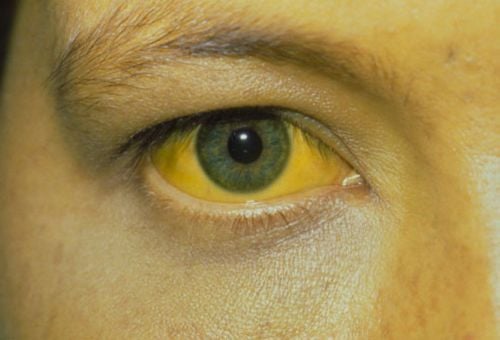This is an automatically translated article.
pyloric stenosis is a fairly common condition today in the pathologies of the gastrointestinal tract. So is pyloric stenosis dangerous, what are the complications of pyloric stenosis that patients should learn and understand to prevent?
1. What is pyloric stenosis?
Pyloric stenosis is a phenomenon where food remains in the patient's stomach, unable to enter the intestine or the process of food descending is very limited, only a small part. pyloric stenosis has many different causes. Among the causes of pyloric stenosis, there are benign causes but also malignant causes, which can be dangerous for the patient.
pyloric stenosis is considered a complication of many different stomach diseases. With gastric pyloric stenosis, if not treated early, it will be dangerous for the patient.
2. Causes of pyloric stenosis
In fact, there are many causes of pyloric stenosis, but among the most common causes are gastric or duodenal disease, sometimes both. pyloric stenosis can also be caused. occur either acutely (for a short time) or over a long period of time. With cases of acute gastritis - duodenitis, the pylorus of the stomach will also narrow according to each episode of inflammation, after the inflammation, the pylorus will tend to return to its original state, typically as acute gastritis. due to excessive alcohol consumption or food poisoning.
Another common cause is gastric ulcer - duodenal ulcer in the small curvature near the pylorus, this condition for a long time will cause the organization of the duodenum to become fibrosis, leading to contraction. causing pyloric stenosis. However, the cause of gastric pyloric stenosis from acute inflammatory diseases as above are benign causes.
Besides the main cause of gastric pyloric stenosis comes from gastritis - duodenal disease, the causes of gastric pyloric stenosis come from cavernous cancer or pyloric cancer which is the cause of malignancy. These tumors constrict the pyloric lumen, in addition to causing inflammation, which accelerates the narrowing process. For a long time, food and gastric juices cannot pass into the intestine because the pylorus is too narrow.
With the cause of tumors, the rate of patients who can have cancer in the antrum, stomach pylorus is quite high. Up to 60% of cases of small curvature cancer, the cardia come from gastric pyloric stenosis.
In addition to the above main causes causing gastric pyloric stenosis, the patient may also have gastric pyloric stenosis in the following cases:
pyloric polyps. Pyloric scarring due to burns. Congenital pyloric stenosis (immediately after birth). Pyloric stenosis due to extragastric causes (pancreatic head tumor, pancreatic head cancer compressing the pylorus).
3. Is pyloric stenosis dangerous?
pyloric stenosis is an alarming condition for the patient's digestive system and overall health. Not only causing inconvenience in daily life, complications of pyloric stenosis can cause patients to decline physically and mentally, more seriously, have stomach infections, stomach cancer or have to have their stomachs removed.
4. Signs of gastric pyloric stenosis
People with pyloric stenosis will have many difficulties in digestion because food and gastric juices are stagnant in the stomach for many hours. Specifically, some of the following symptoms warn you or a loved one that is suffering from pyloric stenosis.
Sharp pain from excessive stomach contractions: This is a reflex for the stomach to try to push digested food and gastric juices into the small intestine. In addition, food stagnation for a while will also cause gastric dilatation, if the patient has gastric ulcer disease, it will also cause long-lasting dull pain. Vomiting: For people with pyloric stenosis, it is easy to experience vomiting with a strong smell accompanied by food. This is the result of the previous day because food and gastric juices are not digested or can not be carried to the small intestine Dehydration, electrolyte disturbances: If the patient vomits a lot, it can lead to dehydration and mineral loss electrolyte disturbances. Pale skin, poor appetite, thin people: If pyloric stenosis is not treated for a long time, it will lead to poor digestion, the patient will also lose weight, lack nutrients, and lose mental and physical health. .
5. Complications of pyloric stenosis
pyloric stenosis is an alarming condition for the patient's digestive system and overall health. Not only causing inconvenience in daily life, complications of pyloric stenosis can cause the patient to decline physically and mentally. Other complications include:
Prolonged vomiting is one of the complications of gastric pyloric stenosis, if this condition lasts for a long time, it can cause weakness because the patient cannot digest food put into the stomach. thick. In addition, pyloric stenosis can also lead to more serious complications such as head cancer, stomach cancer, gastric polyp, gastric necrosis. In general, the level of danger of pyloric stenosis will depend on the degree of stenosis, timely detection and treatment, the patient will not be in danger. However, if the disease progresses seriously, the severity of the narrowing causes complete stagnation of food, which will greatly affect the health, even the life of the patient.
Please dial HOTLINE for more information or register for an appointment HERE. Download MyVinmec app to make appointments faster and to manage your bookings easily.













